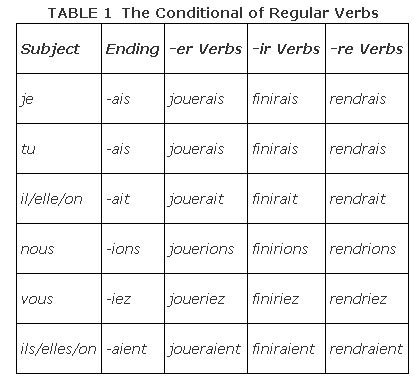The Conditional
The conditional is used to express what would happen given certain events or actions.
The conditional of regular verbs is formed using the same stem (the infinitive) that is used for the future tense and by adding the imperfect endings shown in Table 1. Note that for ‐re regular verbs, the final ‐e from the infinitive ending is dropped before adding the conditional ending.

Forming the conditional of irregular verbs
For irregular verbs and verbs with spelling changes, you simply add conditional endings to the stems used for the future, as shown in the following list.

Irregularities in the conditional also occur in verbs derived from the ones listed above:
- Je le rappellerais. I would call him back.
To negate a sentence in the conditional, simply put ne and the negative word around the conjugated verb:
- Je ne défendrais pas cet homme. (I wouldn't defend that man.)
- Il ne ferait jamais ce travail. (He would never do that work.)
Remember that pronouns remain before the conjugated verb:
- Elle ne le verrait plus. (She would never see him again.)
Questions in the conditional
To form a question using inversion, reverse the order of the subject pronoun and the verb, and join them with a hyphen:
- Visiterais‐tu la Chine? (Would you visit China?)
Negating the conditional
To negate an inverted question, put ne and the negative expression around the inverted form. Remember that all object and adverbial pronouns must remain before the conjugated form of the verb:
- N'y travailleriez‐vous pas? (Wouldn't you work there?)
- Ne la consulterait‐il pas? (Wouldn't he consult her?)
Uses of the conditional
Note the following about when and when not to use the conditional in French:
Be careful to distinguish between “would” as used in the conditional and “would” as used in the imperfect to express “used to”:
- J'irais à Paris. (I would go to Paris.)
- J'allais fréquemment à Paris. (I would [used to] go to Paris frequently.)
Be careful to distinguish between “would” as used to form the conditional and the verb vouloir in the imperfect or in the passé composé to express “would” in the sense of “to be willing”:
- Sous ces conditions, il signerait le contrat. (Under those conditions, he would sign the contract.)
- Il ne voulait pas signer le contrat or Il n'a pas voulu signer le contrat. (He wouldn't [wasn't willing to] sign the contract.)
The conditional of the verb pouvoir (to be able to) is used when “could” means “should be able to”:
- Il pourrait gagner. (He could [should be able to] win.)
- Il ne pouvait pas gagner or Il n'a pas pu gagner. (He couldn't [wasn't able] to win.)
The conditional is used after the following conjunctions of time when the verb in the main clause is in the conditional, even if English uses the past tense:
- quand, lorsque, au moment où (when)
- dès que, aussitôt que (as soon as)
- pendant que, tandis que (while)
- Elle lirait l'article lorsqu' (quand, au moment où) elle aurait le temps. (She would read the article when she had the time.)
- Dès que (Aussitôt que) vous le lui expliqueriez, elle le comprendrait. (As soon as you explained it to her, she would understand it.)
The conditional is used after au cas où (in case) even if English uses the present:
- Je ne sortirai pas au cas où il téléphonerait. (I won't go out in case he calls.)
The conditional is used to soften a request, a desire, or a demand:
- Pourrais‐tu m'aider? (Could you help me?)
- J'aimerais voyager. (I would like to travel.)
- Je voudrais vous parler. (I would like to speak to you.)
The conditional is used to express a possible action or condition in the present:
- Quel temps ferait‐il? Il ferait froid. (What could the weather be like? It could be cold.)
The conditional may be used by reporters and journalists to describe an action that is unsure or not known to be true:
- Le président voyagerait en Afrique. (It is rumored [alleged, said] that the president will travel to Africa.)